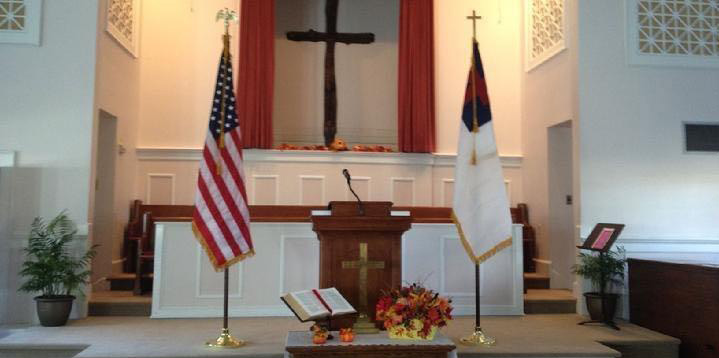It seemed like déjà vu. I was sitting in a worship planning meeting with several other church staff when someone said, “I got another email asking about why the flags are no longer in the sanctuary.” And then the next 20 minutes were wasted discussing something we’ve discussed dozens of times before.
For context, my church used to have the American and Christian flags adorned in the sanctuary at all times, but this past Easter, as an attempt to direct all our attention on the Cross, we removed them. It wasn’t a grand gesture or even something that was given a lot of thought. It was simply a decision made in the moment in an effort to enhance our worship experience.

Justin Pierson
But when the flags didn’t return after Easter, some members grew curious, and even more so, unequivocally angry. How could we think that was a good decision? Why would we disrespect our country and the freedoms it gives us? Yet for some to be so unapologetically against their removal, I find myself appreciating their absence.
There are many reasons I think the flags don’t belong, but for the sake of this article, I’m only arguing for their removal based on how welcoming our churches should be, and I find the display of the American flag during our times of worship to be a potentially unwelcoming symbol for many.
Don’t get me wrong. I enjoy the freedoms I have as an American and I recognize the privilege I have when I criticize the very symbol that represents such a privilege. But am I not able to celebrate that freedom, the people that help keep that freedom, and the country that it represents while recognizing the complexities of the American flag? Yes, for some the flag is a symbol of freedom, opportunity and prosperity, but for others it may have a more troubling meaning.
What about the immigrant mother separated from her child at the border? What about the family of someone who was killed at the hands of a police officer wearing the patch of the flag on his shoulder? What about the Japanese adult who grew up in an internment camp during World War II, the woman from Afghanistan whose family was killed innocently during a bombing by the American military, or the countless African Americans whose ancestors’ labor built the very country the flag represents while not attaining the same rights as whites until the 1960s.
I’m afraid when we put the American flag in our worship spaces, we potentially make people with similar stories feel uncomfortable, distracted or unwelcomed. And if we refuse to remove a symbol that is unwelcoming simply for our own preferences, then I wonder if we are prioritizing others’ homogeny within our communities rather than welcoming others simply by their identity as a child of God.
“I we refuse to remove a symbol that is unwelcoming simply for our own preferences, then I wonder if we are prioritizing others’ homogeny within in our communities rather than welcoming others simply by their identity as a child of God.”
Which is why I’m a proponent of removing the American flag from our spaces of worship. A space of worship is supposed to be where we come together as one people to experience the presence of the divine and to seek its guidance in helping us bring peace to a hurting world. A worship space is not a space for the advancement of outside agendas, of personal ideologies, of business, of national identity, or really anything else. A worship space should serve the need of the worshippers, which is to put our identity on God’s love of all rather than the support of a flag.
So is the American flag in our worship spaces really more important than the inclusion of all God’s children, many who may have different reactions to the American flag? Yes, the flag may be important to you, and I don’t mind if you hold tightly to it. Put it on your car, hang it at your home, wave it at a festival or parade. But can we agree everyone may not feel the same?
And if that is the case, are we really comfortable allowing others to feel unwelcome in our worship spaces because of our personal preferences? If we are, I question whether we want our worship space to serve the needs of worship of God or our own need for control and personal ideology.
Justin Pierson lives in Richmond, Va., where he ministers to young adults. He holds a master of divinity degree from Baptist Theological Seminary at Richmond as well as a master of theology degree from Union Presbyterian Seminary. His ministerial interests revolve around the intersections of faith, culture and justice.
Related articles:
I’m a conservative Christian. I’ve got a problem with the flag | Opinion by Scott Collins
Christians, we have an older glory | Opinion by Taylor Mertens
Christian nationalism deeply embedded into American life, Tyler warns

